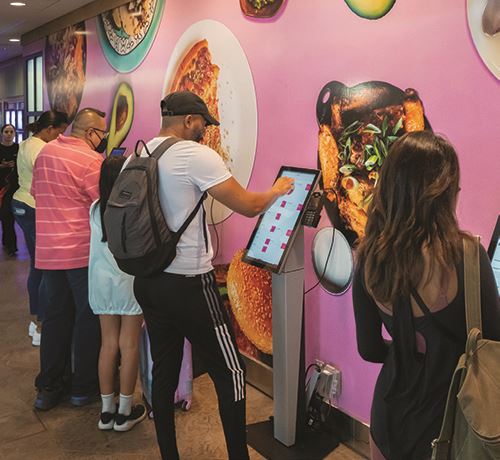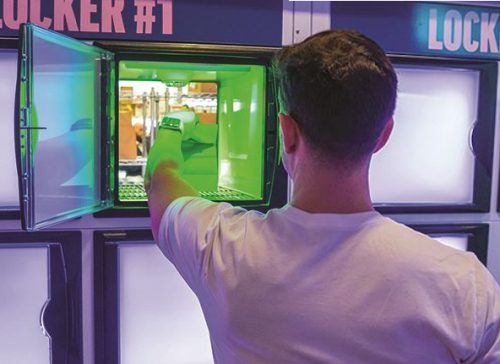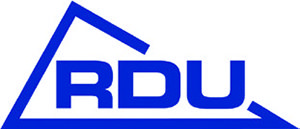One of the three locations shuttered at the North Carolina airport was a California Pizza Kitchen in Terminal 2, and customers missed the option when traffic began to resume. Rather than plugging another standard dine-in/carry-out option into the open spot, management at RDU opted to pioneer an entirely new concept for airports: a virtual food hall with multiple concessionaires.
Like other airports across the globe, Raleigh-Durham International felt the sting of COVID pandemic when concessionaires began pulling out of the terminal after passenger traffic nearly came to a halt. One of the three locations shuttered at the North Carolina airport was a California Pizza Kitchen in Terminal 2, and customers missed the option when traffic began to resume. Rather than plugging another standard dine-in/carry-out option into the open spot, management at RDU opted to pioneer an entirely new concept for airports: a virtual food hall with multiple concessionaires.
The project team floated a request for proposals to develop the innovative idea in August 2021, and then made history by opening the industry’s first “ghost kitchen” in July 2022.
 The new venture is named the getREEF Virtual Food Hall after its contracted operator, REEF Kitchens. The tech-forward format allows guests to order from nine different food and beverage concepts, and they all fit neatly within the footprint formerly occupied by a California Pizza Kitchen. Menu options range from pan-Asian and Tex-Mex to hamburgers and chicken wings. There’s even a pizzeria (800 Degrees Pizza) to replace California Pizza Kitchen. Three options—Beyú Caffé, HUBB Kitchens and American Meltdown—are local brands popular with travelers across the region. Customers place orders and pay for the various offerings on their mobile devices or at kiosks located near the pickup location at Gate C9. Unique text codes allow them to open specially marked lockers to access their orders.
The new venture is named the getREEF Virtual Food Hall after its contracted operator, REEF Kitchens. The tech-forward format allows guests to order from nine different food and beverage concepts, and they all fit neatly within the footprint formerly occupied by a California Pizza Kitchen. Menu options range from pan-Asian and Tex-Mex to hamburgers and chicken wings. There’s even a pizzeria (800 Degrees Pizza) to replace California Pizza Kitchen. Three options—Beyú Caffé, HUBB Kitchens and American Meltdown—are local brands popular with travelers across the region. Customers place orders and pay for the various offerings on their mobile devices or at kiosks located near the pickup location at Gate C9. Unique text codes allow them to open specially marked lockers to access their orders.
|
Project: Ghost Kitchen/Virtual Food Hall Name: getREEF Virtual Food Hall Location: Raleigh-Durham (NC) Int’l Airport Site: Terminal 2, near Gate C9 (space formerly occupied by California Pizza Kitchen) Format: Customers use personal electronics or in-terminal kiosks to place orders, which they pick up from designated lockers that open with individual text codes; 9 separate food/beverage outlets share kitchen space, equipment & personnel Request for Proposals Issued: Aug. 2021 Contract Awarded: Sept. 2021 Grand Opening: July 21, 2022 Contracted Operator: REEF Kitchens Disadvantaged Business Enterprise Partner: J. Johnson & Company LLC, which owns HUBB Kitchens Food/Beverage Concepts: 800 Degrees Pizza; American Meltdown; Beyú Caffé; HUBB Kitchens; Krispy Rice; Pei Wei; Rebel Wings; Xochimex Cantina Grill; Zinburger Construction Cost: About 30% less than build-out for traditional airport restaurants Key Benefits: Convenience & new concessions options for customers & airport workers; sharing space & staff reduces costs for concessionaires; innovative way to offer new food & beverage options following pandemic-related closures; ability to quickly adjust concessions lineup for changing customer base |
“Ghost kitchens are a concept that have been in the food and beverage industry for several years, and we had been thinking about how we might be able to apply it at RDU to really enhance the overall guest experience,” explains RDU Senior Vice President and Chief Revenue Officer David Freedman. “Then COVID happened, and it became something we thought was even more relevant.”
The loss of multiple restaurants, coupled with pervasive labor shortages, made the virtual concept extremely compelling—and strategic.
“The ghost kitchen became an even more appealing opportunity to really enhance the guest experience by providing multiple brands, particularly concepts and good options that we didn’t already have in our terminal,” adds Freedman.
The labor advantages come into play because ghost kitchens, by design, are largely back-of-house operations. “The whole concept of a ghost kitchen is that there really is no front of the house,” says Freedman, explaining that technology eliminates the need for typical restaurant personnel such as hosts, servers and cashiers. “It is all in the back of the house, with cooks and staff preparing the food and then putting it out for pickup or delivery. So, for an entity that is having trouble finding workers because of the overall labor shortage we have throughout the country, this eliminates the need to find front-of-the-house labor.”
Because fewer employees are needed, REEF Kitchens and its various concept partners can afford to pay their back-of-the-house employees a bit more, Freedman adds.
“The ghost kitchen is able to attract workers with competitive wages; we have eliminated the front of the house by using technology; and we have enhanced the guest experience by providing nine different options,” he summarizes. “Overall, it was a big win.”
Adjusting for New Customer Base
Valentina Ellison, senior vice president of Business Development for REEF, is happy to be a part of RDU’s win and the overall evolution of ghost kitchens.
With a 15-year background in airport concessions, Ellison fully understands why food and beverage operators walked away from underperforming locations while the pandemic raged. After all, initial projections suggested that significant air traffic was not anticipated to resume for another seven to eight years.
“Fortunately for all of us, the passengers did return, and they returned a lot faster at a majority of airports,” Ellison says. “And this is where REEF comes in. Customer-facing locations at airports such as RDU were built for pre-COVID times, because it was all about the business traveler that amounted to 80% of all concessions revenue. The business traveler has not returned, and now you have a completely different customer: the millennial generation—Y and Z—that can work from anywhere.”
REEF recognizes that millennials are hopping on planes and traveling the world with their phones and other electronics always in hand, she explains. “They are living on social media, and they are not going to sit down to order a glass of wine.”
 While concessions at most airports are not aligned with this new customer base, REEF allows RDU to customize its lineup accordingly. “Whether it is options for day partying, seasonal offerings or feature concepts, we have so many different merchandising and culinary types,” Ellison notes.
While concessions at most airports are not aligned with this new customer base, REEF allows RDU to customize its lineup accordingly. “Whether it is options for day partying, seasonal offerings or feature concepts, we have so many different merchandising and culinary types,” Ellison notes.
If a concept does not work, REEF can literally can swap it out overnight and add another offering from its portfolio of more than 150 brands, she adds. In contrast, Ellison estimates that rebranding a traditional airport food and beverage concept takes at least six months and requires a minimum investment of $500,000.
The ability to “customize as we go,” gives airports a competitive advantage, she emphasizes. Beyond providing convenience and new options for passengers, the virtual hall at RDU is also proving popular with staff members. “We believe that about one-third of the customers are airport and airline workers, which is also great because it is serving another need,” Ellison remarks.
In terms of construction expenses, she estimates that REEF’s digital wall concept costs one-third less than building out typical airport concessions. She notes that this is particularly important, because raising money is currently very difficult due to uncertainties about inflation and private equity funds.

Customers can place orders at kiosks or from their own mobile devices.
Shared Resources
Drilling down to operational issues and actual food prep, many consider back-of-house efficiencies the real beauty of a ghost kitchen.
 “If we have nine concepts, the average consumer would think there is at least one employee for each concept back there,” says Jason Johnson, owner of HUBB Kitchens, a culinary business incubator based in Raleigh that is the disadvantaged business enterprise partner for RDU’s virtual food hall initiative. “But we have one core employee whose labor is split between nine concepts.”
“If we have nine concepts, the average consumer would think there is at least one employee for each concept back there,” says Jason Johnson, owner of HUBB Kitchens, a culinary business incubator based in Raleigh that is the disadvantaged business enterprise partner for RDU’s virtual food hall initiative. “But we have one core employee whose labor is split between nine concepts.”
With each food and beverage operator sharing costs for employees who support all nine concepts, Johnson deems this an operational win.
“We train the cooks for all nine brands on a flat top station,” Johnson explains, noting that each cook executes a wide array of menu items. “The only thing that is different is the items go in different packaging and different bags because of the brand it belongs to.”
Beating Projections
Ellison reports that the virtual food hall at RDU is surpassing REEF’s own financial estimates. In fact, during its first full month of operation, the new concept pulled in more sales than California Pizza Kitchen did before the pandemic began. “Even though traffic is still not at pre-COVID levels, we are higher in sales,” Ellison emphasizes.
The airport is declining to release revenue figures for the new ghost kitchen, or to characterize its performance to date. That said, the virtual approach seems to be breathing new life into a food and beverage lineup ravaged by the global pandemic. And it may not be long before more airports try the innovative format, too.
Los Angeles International added Breeze, a single concessionaire operating from a ghost kitchen, to its Shop and Dine website lineup in early 2020.


 facts&figures
facts&figures

